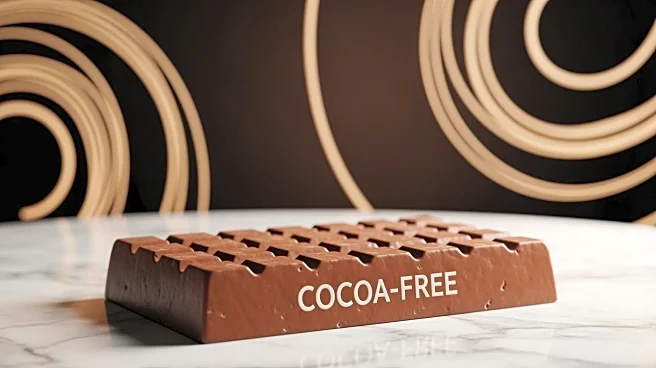What's Happening?
Barry Callebaut, the world's largest chocolate and cocoa manufacturer, is partnering with Planet A Foods to develop a cocoa-free chocolate called ChoViva. This new product is made from sunflower seeds
and aims to meet the growing demand for sustainable chocolate solutions. The partnership comes amid rising cocoa prices and climate risks that threaten traditional cocoa production. While Barry Callebaut reassures that cocoa remains central to its business, the move signals a shift towards exploring alternative ingredients to ensure sustainability and resilience in the chocolate industry.
Why It's Important?
This development is significant as it highlights the chocolate industry's response to environmental and economic pressures. By exploring cocoa alternatives, Barry Callebaut is positioning itself to adapt to potential disruptions in cocoa supply due to climate change and market volatility. This innovation could lead to more sustainable production practices and offer consumers environmentally friendly options. The partnership with Planet A Foods also underscores the importance of collaboration in driving industry-wide change and could set a precedent for other companies to follow suit in seeking sustainable solutions.
What's Next?
As Barry Callebaut continues to develop ChoViva, the company may further invest in research and development to enhance the product's market appeal. The success of this cocoa-free chocolate could influence other manufacturers to explore similar alternatives, potentially leading to a broader industry shift. Additionally, consumer reception to ChoViva will be crucial in determining its market viability and could impact future product offerings. Stakeholders, including environmental groups and industry competitors, will likely monitor these developments closely.
Beyond the Headlines
The move towards cocoa-free chocolate raises questions about the long-term sustainability of traditional cocoa farming. Ethical considerations regarding the livelihoods of cocoa farmers and the environmental impact of alternative ingredients will need to be addressed. This shift could also influence cultural perceptions of chocolate, as consumers may need to adjust to new flavors and textures. The industry's ability to balance innovation with ethical and environmental responsibilities will be critical in shaping the future of chocolate production.










